|
|
|
Sort Order |
|
|
|
Items / Page
|
|
|
|
|
|
|
| Srl | Item |
| 1 |
ID:
100353
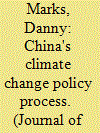

|
|
|
|
|
| Publication |
2010.
|
| Summary/Abstract |
China has recently become the world's largest emitter of carbon and is already facing many harmful effects domestically from climate change. Chinese leaders have therefore made a high-level commitment to curb emissions, as evident in the 2007 National Climate Change Program. However, the government has missed many of its targets, in particular its goal of reducing energy intensity. This essay argues that China is missing its targets because of a number of factors which stem from the fragmented nature of China's authoritarian system. First, environmental policies are too broad and complicated, making it difficult for regulators to enforce the laws. Second, the current incentive structures of promotion and salary cause local officials to give higher priority to economic development than to environmental issues. Third, environmental regulators, such as the judiciary and environmental agencies, remain weak and impeded by enforcement obstacles. While positive changes have occurred, such as the emergence of NGOs and the media as environmental watchdogs and a burgeoning clean technology sector, much remains to be done to improve the long-term viability of climate change policies in China. Based on the preceding analysis, this essay recommends ways by which the government could improve the process of enacting and implementing climate change policies. It also urges the international community to sympathize with the Chinese government and, by leading the way, help the government gain greater compliance with climate change policies.
|
|
|
|
|
|
|
|
|
|
|
|
|
|
|
|
| 2 |
ID:
100346
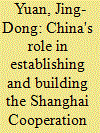

|
|
|
|
|
| Publication |
2010.
|
| Summary/Abstract |
In June 2001, China, Russia, Kazakhstan, Kyrgyzstan, Tajikistan, and Uzbekistan established the Shanghai Cooperation Organization (SCO). While the immediate focus of the organization was to combat the so-called 'three evils'-ethnic separatism, religious extremism, and international terrorism-the SCO's long-term viability and effectiveness in promoting regional stability and economic development depend on how member states build up common identity and cooperate on issues of mutual concern. This article looks at China's role in initiating the Shanghai-5/SCO structure within the broader framework of Beijing's foreign and security policy interests and priorities in Central Asia and seeks to examine both the prospects for and the potential obstacles to its efforts in achieving key objectives for this new regional organization: management of ethnic and religious unrest, including the fight against terrorism and separatism; maintenance of stable borders; development of energy resources; and promotion of economic prosperity. In addition, the article will also examine the extent to which Beijing has used the opportunity to exercise leadership and whether or not China can extend its influence to Central Asia using the SCO as a vehicle.
|
|
|
|
|
|
|
|
|
|
|
|
|
|
|
|
| 3 |
ID:
100351
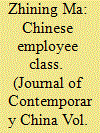

|
|
|
|
|
| Publication |
2010.
|
| Summary/Abstract |
As the 'World's Factory', China now has the biggest worker/employee class in the world. Though this newly emerging social group has captured much attention, relatively few scholars have paid attention to such sociological questions as raised by this paper: rather than referring to such a huge group of almost 500 million people simply as 'Chinese workers' or 'Chinese employees', can this social class be stratified and in what way? What is the current situation of the employee class in China's contemporary industrial relations? This paper attempts to concisely answer the above questions by proposing a three dichotomy segmentation approach and a review of the existing literature on the matter, providing a broader picture to the readers with regards to the current situations of different employee groups in the context of China's unprecedented transitional economy.
|
|
|
|
|
|
|
|
|
|
|
|
|
|
|
|
| 4 |
ID:
100349
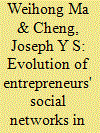

|
|
|
|
|
| Publication |
2010.
|
| Summary/Abstract |
The issue of social networks is central to scholars' examinations of China's economic reform and its transitional society. This article presents an effort to examine the impact of the property rights reform on the evolution of entrepreneurs' social networks in the context of rural China. This study proposes three different patterns of social networks: in-group networks, official-centered networks, and market-oriented networks; and examines how the significance of different network patterns has evolved under the context of institutional change. By using data collected in Wuxi city, Jiangsu province, China, this article attempts to explore four significant questions. Do social networks still matter? How is the significance of different patterns of social networks changing? Why could this happen? In which fields do social networks still matter?
|
|
|
|
|
|
|
|
|
|
|
|
|
|
|
|
| 5 |
ID:
100344
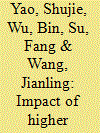

|
|
|
|
|
| Publication |
2010.
|
| Summary/Abstract |
Higher education (HE) in China has been transformed from elite to mass education over the last decade due to commercialisation and funding reform. Many questions have been raised regarding the impact of HE expansion on social justice: what are the implications of the distribution of HE resources on regional inequality? How does it influence different social groups in terms of access to HE? What are the financial implications on different regions and social groups as a result of the funding reform? Based on the official data by region in 1998 and 2006, this paper aims to address these questions and describe how HE has changed over time, both spatially and inter-temporally. Our research results suggest that HE reforms have disadvantaged poor people in impoverished regions despite the availability of HE opportunities for them.
|
|
|
|
|
|
|
|
|
|
|
|
|
|
|
|
| 6 |
ID:
100350
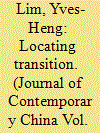

|
|
|
|
|
| Publication |
2010.
|
| Summary/Abstract |
In charting the water of the post-Cold War world, one of the most prominent questions touches upon the likely effects of China's rise. Echoing more or less explicitly power transition theory's assumptions, the rapid and multifaceted ascent of China has popularized the idea of a likely overtaking of the American dominant power by the rising challenger. Sceptics have, however, pointed out that by most standards China remains far from being on a par with the United States. This paper argues that though a global power transition lies far beyond the horizon, the relevant level at which the transition should be considered is the East Asian region, or the Asian 'super-region'.
|
|
|
|
|
|
|
|
|
|
|
|
|
|
|
|
| 7 |
ID:
100340


|
|
|
|
|
| Publication |
2010.
|
| Summary/Abstract |
This paper examines China's transformation from different perspectives, including economic, social and political, and discusses how these transformations are linked to the country's open-door policy. The paper argues that the most powerful driving force behind China's rapid transformation is its openness. At the domestic level, openness creates an institutional environment in which different existing factors reorganize themselves, thus providing new dynamics for change. At the international level, openness links China and the world together, and the interplay between China and the world produces an external dynamism for China's internal changes. Openness, however, has led to social injustice. Society often becomes the weakest link in the process of globalization and opening up; therefore, it must be defended by all means and in all major policy areas.
|
|
|
|
|
|
|
|
|
|
|
|
|
|
|
|
| 8 |
ID:
100342


|
|
|
|
|
| Publication |
2010.
|
| Summary/Abstract |
This article evaluates China's model of development, especially its main component, i.e. its model of governance. It suggests that China's model of development is marked by an imbalance between fast opening of the economy and the society and sluggish opening of the political system. The Chinese society has become much more open, reflected in the Chinese growing awareness of their legal rights. The Chinese economy has become highly internationalized and open, but much of Chinese politics is closed. China's governance is marked by pro-growth authoritarianism. The Chinese state is effective in opening up the economy, promoting reform, and generating economic growth, but offers weak protection of people's rights and ineffectual mitigation of social grievances. These imbalances help produce social protests. Viable solutions are discussed.
|
|
|
|
|
|
|
|
|
|
|
|
|
|
|
|
| 9 |
ID:
100348
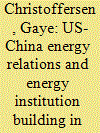

|
|
|
|
|
| Publication |
2010.
|
| Summary/Abstract |
Although China and the US are starting their fourth decade of energy cooperation, it is only recently that there has been a concerted US effort to create a framework for US-China bilateral energy relations. The past 30 years have witnessed many successful energy projects that have lacked follow through and institutionalization, often becoming 'one-off' exercises that duplicated previous projects. Recent initiatives intend to establish long-term linkages between US and Chinese energy bureaucracies, linking energy efficiency, energy security, and environmental issues. The US is nesting the bilateral relationship in global and Asia-Pacific multilateral energy and environmental regimes, and is also using bilateral agreements as mechanisms to promote domestic energy and environmental reform. This paper will examine US-China relations in the Asia-Pacific Partnership on Clean Development and Climate and the Five-Country Energy Ministerial.
|
|
|
|
|
|
|
|
|
|
|
|
|
|
|
|
| 10 |
ID:
100352


|
|
|
|
|
| Publication |
2010.
|
| Summary/Abstract |
Pragmatism has been a leading feature of Communist Party policies since Mao Zedong's death. The attitude to religion has been something of an exception with many restrictions to the freedom of religion stipulated in the constitution. In recent years, while stressing the 'harmonious society', there has been a change in the view of religion. Recognizing the 'spiritual vacuum' in China after Mao, the party has seen the need for a controlled spiritual development that could also support the economic development. However, in this process the party has tried to control not only religious activity but also religious content and to use it for its own purposes. This is in direct opposition to Marx and Lenin's views on 'religion as opium' and indicates that the party is de facto using 'a reversed opium theory'.
|
|
|
|
|
|
|
|
|
|
|
|
|
|
|
|
|
|
|
|
|